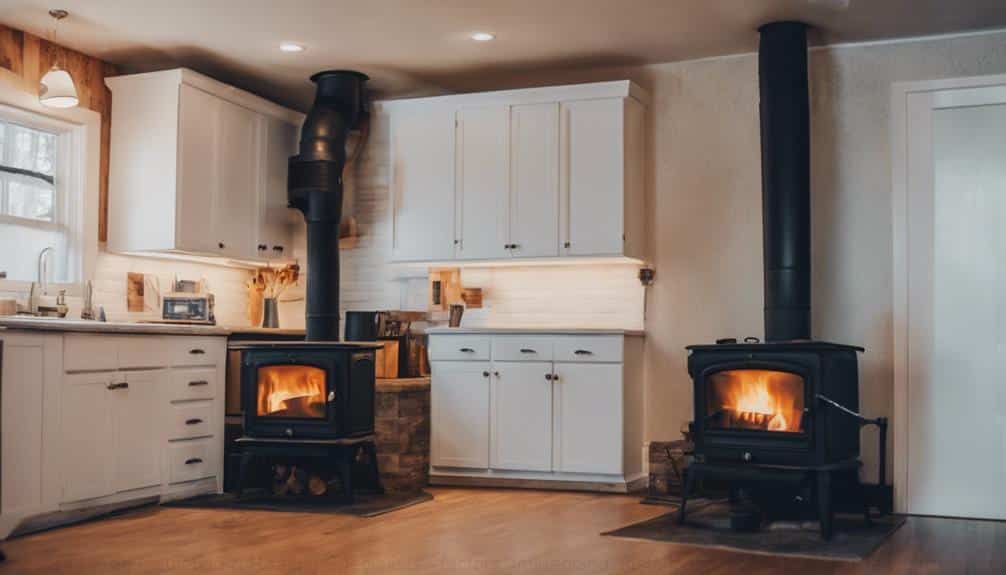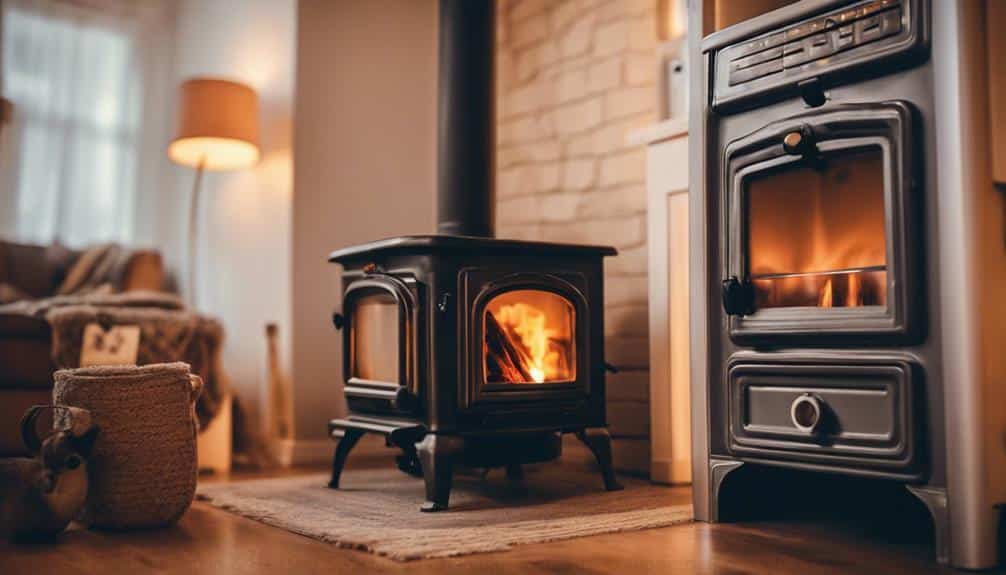Consider key factors such as location, installation, and maintenance expenses when comparing wood and gas heating costs. Gas systems are typically more energy-efficient and easier to manage than wood burners. Environmental impact, fuel efficiency, and compliance with regulations are essential considerations.
Appliance power and fuel type affect output, efficiency, and maintenance requirements. Evaluate efficient fuel conversion and seasonal cost variations for cost comparisons. While wood heating offers reliability, it also poses safety risks and limitations.
Gas central heating excels in heating entire properties and supplying hot water. Explore the pros and cons further for detailed insights.
Table of Contents
ToggleCost Factors & Installation

Analysis of wood fuel costs based on location and comparison of installation and maintenance expenses for wood burners and gas central heating systems are crucial considerations.
Gas systems are more energy-efficient than wood burners, especially for heating multiple rooms. Gas central heating systems are easier to install and maintain.
House size, insulation quality, and personal preferences are factors to consider when evaluating the cost and effectiveness of these heating options.
Environmental Impact & Considerations
When evaluating wood and gas heating systems, factors such as fuel efficiency, emissions impact, sustainability of fuel sources, and adherence to environmental regulations are crucial.
Comparing these systems reveals significant implications for sustainability and efficiency. Understanding the fuel efficiency and emissions impact is essential.
Assessing the sustainability of fuel sources and compliance with environmental standards is also important.
Appliance Power & Fuel Type

When evaluating residential heating systems, considering the connection between appliance power and fuel type is crucial. Factors like power output, efficiency, energy source, cost-effective fuel, and maintenance requirements play a significant role.
Wood stoves typically range from 4kW to 10kW in power output, using wood logs or pellets as the energy source. The efficiency of wood stoves varies based on maintenance efforts, and the cost-effective fuel depends on the type of wood used. Regular cleaning and upkeep are essential for maintaining wood stoves over time.
Comparatively, LPG boilers have higher costs than natural gas options. Understanding these aspects helps in estimating running costs accurately.
Running Costs Comparison
When comparing the running costs of wood and gas heating systems, efficiency is key. Evaluate how efficiently each system converts fuel into heat. Consider seasonal fluctuations in costs.
Factor in maintenance expenses and initial installation costs for a comprehensive comparison.
Pros and Cons of Heating Methods

Wood heating offers reliability during power outages and a wide range of log burners, making it beneficial in rural areas. However, safety risks, installation costs, and the inability to heat entire homes are significant drawbacks.
On the other hand, gas central heating excels in heating entire properties, providing hot water, and being safe when serviced annually. Flexibility in adding components and convenience in operation are additional advantages. Yet, higher installation costs and limited availability in rural locations are key disadvantages.
Individuals should weigh efficiency and safety risks to determine the most suitable heating method for their needs.
Frequently Asked Questions
How Does the Initial Cost of a Wood Burner Compare to a Gas Central Heating System?
The installation complexities of wood burners may result in a higher initial cost compared to gas central heating systems. Gas systems are more energy efficient for heating larger spaces. Consider long-term operational costs for a comprehensive comparison.
Are There Any Health Concerns Associated With Using a Wood-Burning Stove?
Wood-burning stoves can pose health risks due to indoor air pollution from particulate matter and carbon monoxide emissions. The environmental impact depends on the fuel type and stove efficiency. Proper ventilation and maintenance are crucial to reduce these risks.
Can Wood-Burning Stoves Be Used as a Primary Heating Source in All Climates?
Wood-burning stoves can serve as the primary heating source in various climates based on insulation and house size. Consider energy efficiency, cost comparison, and environmental impact. Regular maintenance is crucial for optimal performance.
What Are the Maintenance Requirements for Gas Central Heating Systems?
Gas central heating systems benefit from regular maintenance for optimal performance, longevity, and energy efficiency. Proper servicing prevents breakdowns, reduces repair costs, and enhances overall system reliability. This maintenance ensures efficient operation and extends the system's lifespan.
Is There a Significant Difference in the Resale Value of Homes With Wood Burners Versus Gas Heating Systems?
Heating systems can affect energy efficiency and home value. Gas heating systems are convenient and widely appealing, adding more value to a property. On the other hand, wood burners, while charming and cost-effective, may have varying impacts on resale value.



